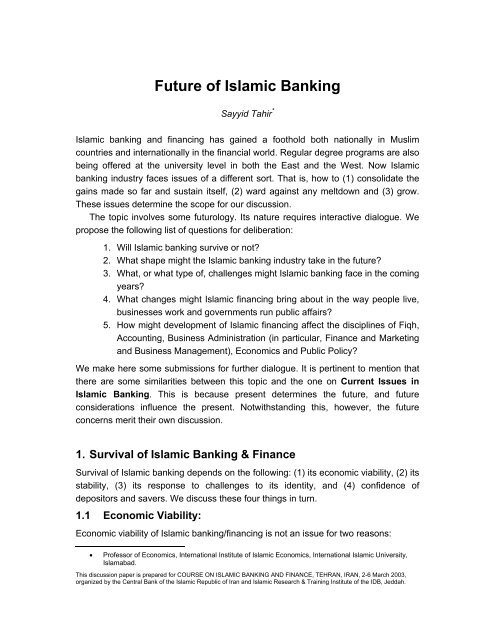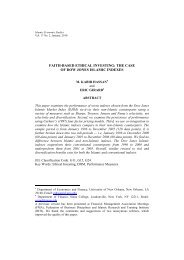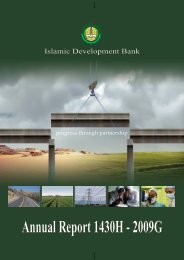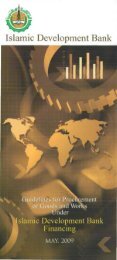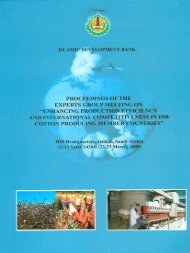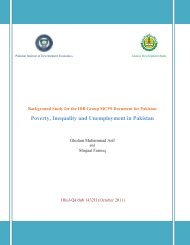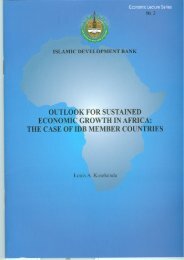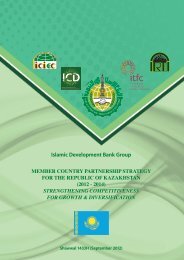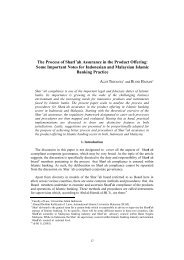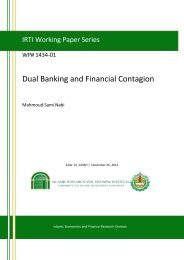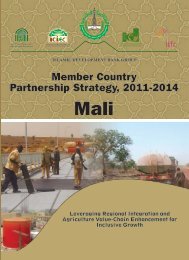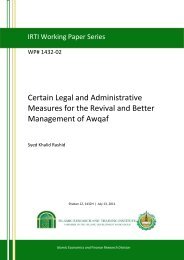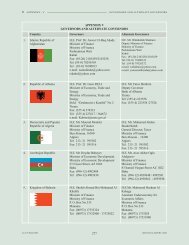Future of Islamic Banking - IRTI
Future of Islamic Banking - IRTI
Future of Islamic Banking - IRTI
Create successful ePaper yourself
Turn your PDF publications into a flip-book with our unique Google optimized e-Paper software.
<strong>Future</strong> <strong>of</strong> <strong>Islamic</strong> <strong>Banking</strong> 2(1) <strong>Islamic</strong> banking is just another way <strong>of</strong> banking.(2) <strong>Islamic</strong> banking <strong>of</strong>fers a better financial architecture, on economicgrounds.Let us take the case <strong>of</strong> a bank client (C) who actually needs to buy something forwhich he does not have funds to meet the seller (S)’s demand for payment. Currentlya bank (B) comes in the picture as follows:LoanBCash PaymentB C SRepayment <strong>of</strong> Loan(Principal + interest)The ThingInterest-based Solution: Bank as LenderThe prohibition <strong>of</strong> riba makes the loan option economically infeasible for the bank. Itcan, however, still play a meaningful role and help the client to tide over his liquidityproblems as follows:(4) Deferred Payment* (1) Cash PaymentC B S(3) The Thing (2) The ThingB* Cash price + Bank’s margin<strong>Islamic</strong> Solution: Bank as TraderThe above picture will remain by and large the same if the client needs something onlease basis. 1 However, if usage <strong>of</strong> funds involves several transactions at the client’send, <strong>Islamic</strong> bank can share its resources with the client under partnershiparrangements—modarabah or musharakah—to do the needful.The above analysis implies that <strong>Islamic</strong> banks will always be able to addressfinancing concerns <strong>of</strong> their clients. And, in fact, they will have more than one distinctoption to do so. 2 Note that financial tag for <strong>Islamic</strong> financial instruments need not bean issue because numbers can always be worked out to show that cost <strong>of</strong> <strong>Islamic</strong>financing remains the same as that associated with interest-based financing.It is also noteworthy that <strong>Islamic</strong> financing implies direct linkage between financialflows and real flows in the economy. That is, funds will flow from <strong>Islamic</strong> banks onlyagainst real economic activity. Thus, investors will approach <strong>Islamic</strong> banks only1 Of course, in that case lease agreement will replace sale agreement between the bank and theclient. And, if sub-leasing is involved, purchase agreement <strong>of</strong> the bank with supplier shall besubstituted by a lease agreement.2 Interest-based banks use different variants <strong>of</strong> loan transaction. These instruments differ only in theirdegree <strong>of</strong> complexity stemming from the nature <strong>of</strong> financing request.
<strong>Future</strong> <strong>of</strong> <strong>Islamic</strong> <strong>Banking</strong> 5As per the existing approaches as understood by us, there is little differencebetween hire-purchase practiced by <strong>Islamic</strong> banks and financial lease condemned bythe fuqaha as a transaction <strong>of</strong> riba. Similar points may be raised about some otherfinancial instruments adopted by <strong>Islamic</strong> banks. The line <strong>of</strong> distinction between<strong>Islamic</strong> financing and interest-based financing must always be above reproach inorder to avoid identity crisis for <strong>Islamic</strong> banking.1.4 Confidence <strong>of</strong> Depositors and Savers:Dr. Tariqullah Khan recently raised this issue as follows. “A bank licensed as an<strong>Islamic</strong> bank may be running on a very sound financial footing. However, if thedepositors came to know that the bank has violated its Shari’ah mandate, thedepositors will lose confidence and the finding will trigger deposit withdrawal andprobably collapse <strong>of</strong> the bank. By contagion effect this can lead to financial instabilitythreatening economic development”.One may add that success begets envy and, hence, scrutiny. Caution is,therefore, warranted against any thing that creates doubts about the Shari’ahcredentials <strong>of</strong> <strong>Islamic</strong> banks’ transactions, especially on the financing side.2. Likely Shape <strong>of</strong> <strong>Islamic</strong> <strong>Banking</strong> & Finance in <strong>Future</strong>2.1 <strong>Islamic</strong> Banks as Pure Financial Institutions:<strong>Islamic</strong> banks will become pure financial institutions that fill financial gaps standing inthe way <strong>of</strong> real economic transactions at the grassroots level. The followingeconomic factors will lead to this development.Practitioners <strong>of</strong> <strong>Islamic</strong> banking will recognize that efficiency and gains lie inspecialization. They will, therefore, delegate to third parties responsibility for fieldoperations in lieu <strong>of</strong> a financing transaction, <strong>of</strong> course, in return for a charge. In somecases, such as taking physical possession <strong>of</strong> a thing in trade- or lease-basedfinancing, this third party may be the bank’s client himself. This is likely to happenbecause economies <strong>of</strong> scales enjoyed by third-party specialized institutions willreduce operational costs for the banks. In the end, one expects <strong>Islamic</strong> banksinstitutions to touch the economic landscape only on the financial plane, i.e., becomepure financial institutions—while acting as economic agents.Notwithstanding the above, regulators also need to recognize the followingdanger. <strong>Islamic</strong> banks, as already seen, will provide financing by coming in thepicture as traders, lessors or partners. This factor along with their ability to mustersizeable funds can have potentially damaging implications. For example, if there areno checks on the scope <strong>of</strong> trading operations <strong>of</strong> <strong>Islamic</strong> banks, mega traders willemerge as the expense <strong>of</strong> small traders and businesses. This monopoly problemcan be addressed through limiting the role <strong>of</strong> <strong>Islamic</strong> banks to financing matters only.
<strong>Future</strong> <strong>of</strong> <strong>Islamic</strong> <strong>Banking</strong> 8• Formulas for pricing <strong>of</strong> <strong>Islamic</strong> financial products3.2 Competition:<strong>Islamic</strong> banks should be ready to brace not only intra-industry competition but alsointer-industry competition from interest-based banks. The latter are already <strong>of</strong>fering<strong>Islamic</strong> financial products. The competition is likely to grow.3.3 Misuse <strong>of</strong> <strong>Islamic</strong> <strong>Banking</strong>Unless there are effective checks and monitoring, vested interests may use <strong>Islamic</strong>banking to bypass the Ahkam on riba. For example, in the existing murabahahfinancing banks do not directly come into the picture as buyers from the would-besuppliers. This gives dishonest fund-seekers a window for getting credit from thebank through fictitious purchases. Moreover, without effective checks and monitoring,some bankers under financial pressures may be tempted to provide funds throughdummy transactions. For example, a person might get $1000 from a bank by thebank first buying a bread—or something dirt cheap, not worth $ 1000—from theclient’s close relative and then selling the same to the client at a higher price.4. Effect <strong>of</strong> <strong>Islamic</strong> <strong>Banking</strong> on Economy and Economic LifeThe following effects are anticipated:• The real and financial sectors in the economy will be better integrated, ascompared to what one finds in interest-based economies.• Both what the governments do and the way in which they work, will change.This will mainly stem from the fact that without tax revenues, governmentsmay address only those needs for which an economic transaction—other thanpure loan transaction—can be defined between the government and thefinanciers. Economic considerations will in the long run lead to development<strong>of</strong> “Fiqh for Government” that would regulate economic activity at thegovernment level. 5• Inter-bank money market and central banking will take new form. New matrix<strong>of</strong> Shari’ah-compliant divisible and tradable financial instruments and theShari’ah parameters for contracts will give shape to this development. 6While the above happens, the regulators will also have to ensurecompliance with Basel requirements for international acceptability <strong>of</strong> <strong>Islamic</strong>banking. In cases <strong>of</strong> no conflict between the Shari’ah parameters and the5 Note that Ahkam in the Qur’an and Sunnah are primarily at the individual level. In the past, Fuqahadid draft rules for governance. But those are <strong>of</strong> a recommendatory, rather than mandatory, nature. Amodest attempt at developing fiqh for government is made in Chapter 5 <strong>of</strong> IIIE’s Blueprint <strong>of</strong> <strong>Islamic</strong>Financial System (Islamabad: International Institute <strong>of</strong> <strong>Islamic</strong> Economics, 1999).6 See, for example, Chapter 7 <strong>of</strong> IIIE’s Blueprint, op. cit. There is need for comparative study <strong>of</strong> thedevelopments in Iran, Sudan and Malaysia.
<strong>Future</strong> <strong>of</strong> <strong>Islamic</strong> <strong>Banking</strong> 9Basel requirements, there would be no problem. However, where conflictarises, there will be need (1) to design Shari’ah-compatible ways forcompliance with the Basel requirements and (2) to sell the same to theinternational regulators.• Accounting and financial management may undergo major changes. Thiswould happen because Islam has different position on ownership, rules fortransactions and the financial instruments.• <strong>Islamic</strong> banking will lead to better business ethics because banks willentertain only economically viable financing requests. Note that the saidtransformation shall take place even without prior moral uplift <strong>of</strong> the society for<strong>Islamic</strong> banking. Careful design <strong>of</strong> <strong>Islamic</strong> financial instruments willdiscourage unscrupulous behavior by fund-seekers.5. Effect <strong>of</strong> <strong>Islamic</strong> <strong>Banking</strong> on Various DisciplinesFiqh: A change is already taking place. Instead <strong>of</strong> thinking within the narrowdomains <strong>of</strong> Hanafi, Maliki, Shafie, Hanbali and Ja’fari fiqhi schools,contemporary fuqaha are joining hands and looking for common ground thatbest suits contemporary needs.OIC Fiqh Academy and AAOIFI provide formal international platforms.Individual <strong>Islamic</strong> banks have either international representation on theirShari’ah Boards or they are open to international influences.Accounting, Financial Management, Marketing and Bank Management:When full significance <strong>of</strong> the Shari’ah is recognized, these areas will change.The impetus will come from, among other factors, <strong>Islamic</strong> concept <strong>of</strong> “rights”(based on <strong>Islamic</strong> view <strong>of</strong> ownership) and permissible forms <strong>of</strong> transactions.Economics: New economics will emerge for the new economic setup. Changes willbe more noticeable in the areas <strong>of</strong> macro and monetary economics.Public Policy: A paradigm shift will take place due to changes in whatgovernments may do and the ways in which they would work.6. Some Other Relevant Points6.1 With <strong>Islamic</strong> banking gaining ground, new challenges are already emerging forredrafting the rules for international trade and accommodating Shari’ahcompliantforeign trade financing. A good deal <strong>of</strong> work has been done, but a lotmore is needed.If <strong>Islamic</strong> financing is adopted at the state level, inter-governmental financialflows will change, in both form and size.6.2 Forces <strong>of</strong> the status quo will always resist change. Hence, every now and thenissues would be raised about what riba is or what it is not.
<strong>Future</strong> <strong>of</strong> <strong>Islamic</strong> <strong>Banking</strong> 106.3 Government finances will remain a problem in the way <strong>of</strong> <strong>Islamic</strong> banking untilsufficient new financing tools are developed and a consensus develops on theeconomic and social role <strong>of</strong> government.6.4 While the thrust <strong>of</strong> the present efforts in <strong>Islamic</strong> banking is on the financing side,matters related to liability side <strong>of</strong> <strong>Islamic</strong> banks will become an issue in future.The way in which <strong>Islamic</strong> banks look after interests <strong>of</strong> various groups <strong>of</strong>depositors and what they actually do, both are likely to become an issue. 7CONCLUDING OBSERVATIONS:“Highly ethical, well-regulated and beneficial <strong>Islamic</strong> financial architecture is possible.Indeed, working in this field with more transparency, with effective corporategovernance and with better interaction with relevant international, regional andnational institutions, will definitely help all [those] who want to contribute to thewelfare <strong>of</strong> their community as well as to the welfare <strong>of</strong> the world as a whole. 8____________Tehran – <strong>Future</strong> <strong>of</strong> <strong>Islamic</strong> <strong>Banking</strong>/Sayyid Tahir/23 Feb 20037 Chapter 4 <strong>of</strong> IIIE’s Blueprint, op. cit., throws light on some <strong>of</strong> the relevant issues.8 The author owes these observations to Dr. Tahir Memmi <strong>of</strong> the IDB, Jeddah.


